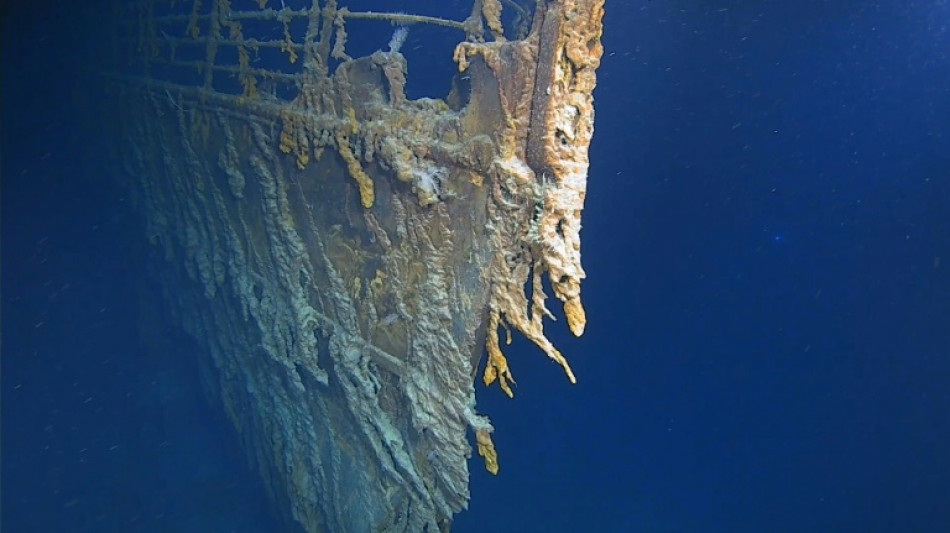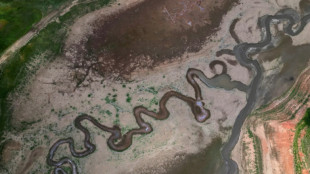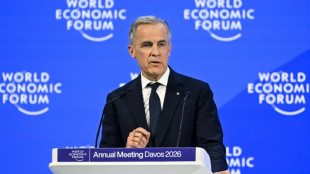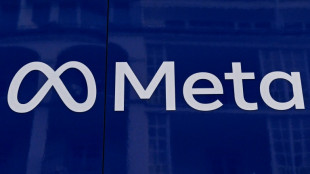
-
 Japan ex-PM Abe's alleged killer faces verdict
Japan ex-PM Abe's alleged killer faces verdict
-
Climate change fuels disasters, but deaths don't add up

-
 Stocks stable after tariff-fuelled selloff but uncertainty boosts gold
Stocks stable after tariff-fuelled selloff but uncertainty boosts gold
-
What growth?: Taiwan's traditional manufacturers miss out on export boom

-
 'Super-happy' Sabalenka shines as Alcaraz gets set at Australian Open
'Super-happy' Sabalenka shines as Alcaraz gets set at Australian Open
-
With monitors and lawsuits, Pakistanis fight for clean air

-
 Sabalenka sets up potential Raducanu showdown at Australian Open
Sabalenka sets up potential Raducanu showdown at Australian Open
-
Chile president picks Pinochet lawyers as ministers of human rights, defense

-
 Osaka says 'I'm a little strange' after Melbourne fashion statement
Osaka says 'I'm a little strange' after Melbourne fashion statement
-
UN report declares global state of 'water bankruptcy'

-
 Trump heads for Davos maelstrom over Greenland
Trump heads for Davos maelstrom over Greenland
-
Ukraine's Oliynykova wants Russian, Belarusian players banned from tennis

-
 Kasatkina cannot wait to be back after outpouring of Melbourne support
Kasatkina cannot wait to be back after outpouring of Melbourne support
-
Chile blaze victims plead for help from razed neighborhoods

-
 Russian minister visits Cuba as Trump ramps up pressure on Havana
Russian minister visits Cuba as Trump ramps up pressure on Havana
-
World order in 'midst of a rupture': Canada PM Carney tells Davos

-
 Senegal's 'historic' AFCON champs honoured with parade, presidential praise
Senegal's 'historic' AFCON champs honoured with parade, presidential praise
-
Audi unveil new car for 2026 Formula One season

-
 Man City humiliated, holders PSG stumble, Arsenal remain perfect
Man City humiliated, holders PSG stumble, Arsenal remain perfect
-
Vinicius, Real Madrid need 'love' not whistles: Bellingham

-
 Late Suarez winner stops Champions League holders PSG in Lisbon
Late Suarez winner stops Champions League holders PSG in Lisbon
-
Frank seeks Spurs 'momentum' after beating Dortmund

-
 Jesus' 'dream' brace at Inter fires Arsenal into Champions League last 16
Jesus' 'dream' brace at Inter fires Arsenal into Champions League last 16
-
US regulator appeals Meta's court victory in monopoly case

-
 Netflix shares fall as revenue appears to stall
Netflix shares fall as revenue appears to stall
-
Tottenham beat 10-man Dortmund to hand Frank stay of execution

-
 Mbappe, Vinicius help Real Madrid thrash Monaco in Champions League
Mbappe, Vinicius help Real Madrid thrash Monaco in Champions League
-
Men's Fashion Week kicks off in Paris with Louis Vuitton show

-
 Jesus fires Arsenal past Inter and into Champions League last 16
Jesus fires Arsenal past Inter and into Champions League last 16
-
Muted anniversary: Trump marks first year back with grievances

-
 Humiliated Man City have to 'change the dynamic': Guardiola
Humiliated Man City have to 'change the dynamic': Guardiola
-
Golden State's Butler out for season with ACL injury: agent

-
 Venezuela woos US oil majors with new investment czar
Venezuela woos US oil majors with new investment czar
-
Wales Six Nations strike threat just 'speculation' for Tandy

-
 Syria government agrees new truce with Kurdish forces
Syria government agrees new truce with Kurdish forces
-
Russian interior minister in Cuba, which faces pressure from Trump

-
 US finalizes rule for deep-sea mining beyond its waters
US finalizes rule for deep-sea mining beyond its waters
-
Iran protest crackdown latest developments

-
 Muted anniversary: Trump marks first year back with familiar grievances
Muted anniversary: Trump marks first year back with familiar grievances
-
Man City stunned by Bodo/Glimt in epic Champions League upset

-
 Cooler temperatures offer respite for Chile firefighters
Cooler temperatures offer respite for Chile firefighters
-
Scientists plan deep-sea expedition to probe 'dark oxygen'

-
 Howe calls on Newcastle to use spirit of Robson to inspire win over PSV
Howe calls on Newcastle to use spirit of Robson to inspire win over PSV
-
Massive US presence makes its mark on Davos

-
 Ter Stegen to join Girona on loan: Barca coach Flick
Ter Stegen to join Girona on loan: Barca coach Flick
-
France PM forces part of budget through parliament without vote

-
 Scotland boss Townsend picks veterans Gray and Cherry for Six Nations
Scotland boss Townsend picks veterans Gray and Cherry for Six Nations
-
Record try-scorer Penaud faces French axe for Six Nations

-
 UK approves plans for Chinese mega-embassy in London
UK approves plans for Chinese mega-embassy in London
-
Rosenior keen to build winning ties with 'world-class' Fernandez


The ship sank. Or did it? Titanic misinformation swirls
The Titanic inspired a tear-jerking blockbuster and expeditions to its watery gravesite -- including a fatal one this week -- but viral TikTok videos peddle a stunning conspiracy theory: the ship never sank.
More than a century after it went down in the North Atlantic Ocean, wild myths and urban legends about the luxury liner have continued to swirl, including that it was doomed by the curse of a mummified Egyptian priestess.
Even more striking are a wave of TikTok videos asserting that the Titanic did not sink at all. Many of them have racked up millions of views -- never mind that the claim fails to hold water.
"The Titanic never truly went under," said a video by a TikTok user called "The Deep Dive," which garnered more than four million views.
"Everyone is familiar with the tale of the unstoppable ship that perished after colliding with an iceberg, but perhaps that isn't the case."
The video opens with a dramatic portrait of the Titanic, its stern crashing against stormy waves, as an imperious male voice goes on to claim that it was swapped with its sister ship –- the Olympic.
He alluded to an oft-repeated conspiracy theory that the company that built the Titanic purposely sank the Olympic, another one of its ships, as part of an elaborate insurance fraud.
A similar TikTok video claiming "the Titanic never sank" garnered 11 million views. The video was removed earlier this year in what appeared to be a rare intervention after it was widely reported by the US media.
- Historical falsehoods -
TikTok's algorithm and engagement-based recommendation system, which creates personal feeds for users based on their preferences, makes it a powerful platform to propagate conspiracy theories, experts say.
"This makes it easier for this type of content to spread," Megan Brown, a senior research scientist at New York University's Center for Social Media and Politics, told AFP.
"The other factor that makes it easier for historical conspiracy theories to spread over other types of conspiracy theories or misinformation is that it's typically not moderated content."
While the platform says it removes posts that cross its threshold of "significant harm" –- such as violence or harassment –- other seemingly benign content laced with falsehoods remains untouched.
That approach, researchers say, underscores a key dilemma facing social media platforms: How to tackle an explosion of misinformation without giving users the impression that they are restricting free speech?
That gap in policy has given rise to a breed of users who flourish on the back of disproven conspiracy theories that generate strong engagement, such as the Earth is flat and the 1969 Moon landing was a hoax.
- 'Sad part' -
That also includes TikTok's Titanic influencers -- focused on the vessel that sank in 1912 during its maiden voyage from England to New York after hitting an iceberg.
The proliferation of Titanic conspiracy theories on the popular platform may appear benign compared to other falsehoods that result in real-world harm, but historians say it remains vital to debunk them.
They worry conspiracy theories will affect how a generation of young people –- who often rely on platforms such as TikTok as a primary source of information -- learn about the tragedy.
"The sad part is that many of the people following this sort of thing are teenagers," said Charles A. Haas, founder of the Titanic International Society, which is dedicated to research about the ill-fated ship.
"They are woefully unwilling to do digging," Haas told the New York Times.
TikTok influencers and celebrities are increasingly taking over from journalists as the main source of news for young people, according to a report published this month by the Britain-based Reuters Institute.
The report found that 55 percent of TikTok and Snapchat users and 52 percent of Instagram users get their news from "personalities" -- compared to 33-42 percent who get it from mainstream media and journalists on those platforms.
That was reflected in how millions of young users turned to TikTok this week for updates on the five people aboard a tourist submersible that vanished in the North Atlantic Ocean on their way to visit Titanic's seabed wreckage, on a $250,000 ticket.
All five died after the craft suffered what the US Coast Guard said was a "catastrophic implosion" in the ocean depths.
"What if this all is a cover up?" asked a young TikTok user, referring to wall-to-wall news coverage about the submersible.
"Is there something behind the scenes that we're not seeing?" he added, peddling another unfounded conspiracy in a video that racked up over 4.2 million views.
K.Thomson--BTB




